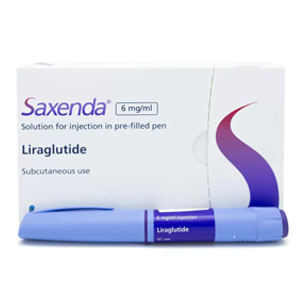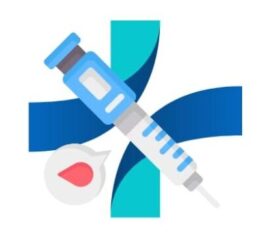Weight Loss Treatments
We offer the following weight loss injections treatment and oral tablets options to help you in your weight loss journey. You can request weight loss injections and tablets online at Slim PharmEasy. All treatment options are subject to approval by our USA-registered prescribers following the completion and assessment of the medical consultation form. View the weight loss treatment options below for more information.
Wegovy
(Semaglutide Injections)

- Once-weekly weight loss injection (semaglutide)
- 1 pen = 4 weeks
- Avg weight loss of ~15%
In-stock – From $210.00
Mounjaro
(Tirzepatide Injections)

- Mounjaro is a once weekly injection containing Tirzepatide
- 1 pen = 4 weeks
- Avg weight loss of ~20%
In-stock – From $205.00
Ozempic
(Semaglutide Injections)

- Ozempic is a once weekly injection pre-filled with Semaglutide
- Licensed by the MHRA and prescribed off label to treat weight loss
In-stock – From $210.00
Saxenda
(Liraglutide)

- Saxenda (Liraglutide) is pre-filled a once-daily injection
- Prescription medication licensed to treat weight loss
In-stock – From $94.99
Frequently asked questions about weight loss
What causes obesity?
Weight gain occurs when you regularly eat more calories than you use through normal bodily functions and physical activity. But the lifestyle habits causing your weight gain aren’t always obvious. Weight gain can be compounded by psychological factors, as well as certain medications, such as steroids and insulin, and medical conditions such as hypothyroidism. There is also emerging evidence to suggest that some people are more genetically susceptible to obesity.
Losing weight means eating fewer calories and burning more energy through physical activity. It sounds simple. But more than 60% of adults in England are overweight or obese. Our lifestyles see many of us eating more calories than we need and not doing enough physical activity.
What is BMI?
Body Mass Index (BMI) is essentially a measure of body size. It is a calculation based on your height and weight that is used to work out if your weight is healthy. Your BMI will be calculated as a number which represents your height to weight ratio i.e. 27 kg/m2.
The following table shows BMI range categories for adults associated with weight status:
| BMI | Weight status |
|---|---|
| Below 18.5 | You are in the underweight range |
| 18.5 – 24.9 | You are in the healthy range |
| 25.0 – 29.9 | You are in the overweight range |
| 30.0 and above | You are in the obese range |
Why you may be struggling to lose weight?
Everyone is different and responds differently to what they eat and how effective exercise is. Losing weight is difficult and can take time. Just dieting and exercise may either not result in clinically significant weight loss, or you may not be able to sustain it, and that is where medication can help you lose weight.
Our weight loss experts are here to recommend and prescribe the most appropriate treatment option for you and help you lose weight.
Do I need to continue with diet and exercise whilst on medication?
Absolutely. The weight loss medication we prescribe are to be taken in combination with a sensible diet and exercise and that is when you see the most effective weight loss.
What is the difference between Saxenda (Liraglutide) and Ozempic (Semaglutide)?
Saxenda (Liraglutide 3.0mg) and Ozempic (semaglutide) are both GLP-1 analogues, which means they behave like the naturally produced hormone called Glucagon Like Peptide (GLP-1). Semaglutide has a longer duration of action than Liraglutide, hence it is a once-weekly injection.
Saxenda has a license to specifically treat weight-loss, whereas Semaglutide, although a licensed medication and very effective in treating weight loss, is awaiting marketing authorisation by the regulatory authority, MHRA. The license to treat weight loss has been granted by the FDA in the USA.
Semglutide is a once weekly injection whereas Liraglutide 3mg (Saxenda) injection has to be given every day. This because Semaglutide has a longer duration of action in the body. Research shows that semaglutide is more effective in improving blood glucose control and weight loss compared to Liraglutide.
The current available maximum dose of semaglutide (Ozempic) is 1mg, which is licensed to treat diabetes. The anticipated dose to treat weight loss weight loss will be 2.4mg.
What is off-label prescribing?
Off-label prescribing is when you are prescribed a licenced medication to treat a condition not specifically stated or listed on its product license.
Towards the end of the drug development process, the pharmaceutical company applies for a license to treat a specific condition and submits the results of its trials to the Medicines and Healthcare Products Regulatory Agency (MHRA) or the European Medicines Agency (EMA). If the license is granted, it will specify certain information regarding the medication, such as who can use it, what dosage, storage and usage instructions, side effects and contraindications and what conditions it may be used to treat. This can all be found in the patient information leaflet provided with the medicine.
Prescribing outside of these guidelines included with the license of any medicine means that it is being used “off-label”. Our prescribers at the Mayfair Weight Loss Clinic will only prescribe off-label if they believe that the medication will be effective at treating the condition in question, and that the advantages outweigh any potential risks.
Off-label prescribing is fairly common and is a safe practice as long as the patient’s condition, medical history, allergies and current medicines are taken into consideration. Being prescribed a medicine off-label doesn’t mean that the drug is unlicensed – these two terms mean very different things and shouldn’t be confused with each other. An off-label medicine is simply a medicine that does have a UK or EU license, but not for the purpose that it’s being used for.
Please read our section on ‘ off-label prescribing’ for more information
